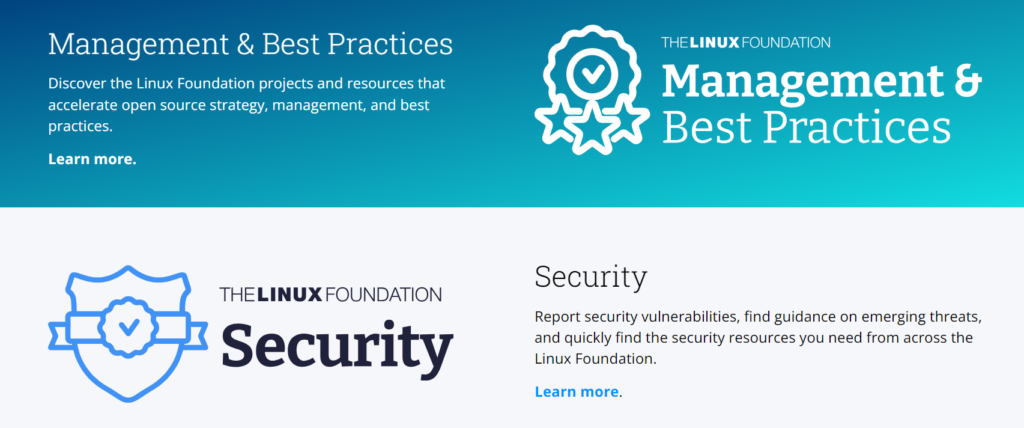The Linux Foundation is a nonprofit organization established in 2000 with the mission of fostering the growth, development, and adoption of Linux and other open-source software technologies.
It serves as a neutral hub where developers, corporations, and communities can collaborate on building and maintaining open-source projects in various industries, including cloud computing, blockchain, artificial intelligence, and more.
While Linux is its most well-known project, the foundation also supports a wide array of other important open-source projects, such as Kubernetes (container orchestration), Hyperledger (blockchain), and Cloud Native Computing. It provides leadership, training, and certification to ensure the long-term sustainability of open-source initiatives.
In addition to software development, The Linux Foundation offers training and certification programs for professionals looking to enhance their skills in open-source technologies, including Linux system administration, Kubernetes, and DevOps. It also hosts global events that bring together communities and companies to collaborate, learn, and share innovations in open-source.
In summary, The Linux Foundation is a leading force in advancing open-source collaboration and innovation, supporting both individuals and companies in their pursuit of open, secure, and sustainable technologies.

Linux Foundation Overview
The Linux Foundation plays a key role in managing large-scale open-source projects and supporting the community with funding, infrastructure, and collaboration tools.
It supports a wide variety of initiatives in different industries, enabling innovation and growth through open-source software.
The foundation’s activities include providing training and certification programs, hosting open-source projects, and conducting global events to engage with developers and companies.
Key projects hosted by The Linux Foundation include Kubernetes, Hyperledger, and Node.js, along with a wide range of other technologies crucial to the modern IT ecosystem.
Through partnerships with industry leaders such as IBM, Intel, Google, and Microsoft, The Linux Foundation has established itself as a trusted partner for fostering enterprise-grade open-source solutions.
Also, read:
Features of Linux Foundation
- Project Hosting & Governance: The Linux Foundation offers robust infrastructure and governance models for open-source projects. They provide essential services like code repositories, continuous integration, and project management support to help projects scale and thrive.
- Training & Certification: The foundation provides a wide range of high-quality online courses and certification programs for open-source technologies. These include courses on Linux, Kubernetes, DevOps, cloud infrastructure, and more. Popular certifications include:
- Certified Kubernetes Administrator (CKA)
- Linux Foundation Certified System Administrator (LFCS)
- Certified Hyperledger Fabric Developer (CHFD)
- Collaboration & Networking: The Linux Foundation hosts a variety of global events and conferences, such as Open Source Summit and KubeCon, offering a platform for developers, executives, and contributors to collaborate, network, and share knowledge.
- Open Source Leadership: Through its open-source program office, The Linux Foundation provides best practices for managing open-source communities, legal guidelines, and strategies for sustainable project management.
- Enterprise Support: The foundation partners with leading enterprises, offering solutions and support for integrating open-source technologies into their business operations. Companies can join The Linux Foundation as members, gaining access to resources and industry insights.
Pricing of Linux Foundation
The Linux Foundation offers various pricing tiers depending on the type of membership, training, certifications, and corporate sponsorships. Here’s a breakdown of the key pricing elements:
1. Individual Membership
- Price: $99 per year
- Student Discount: $25 per year
- Benefits: Members get access to exclusive events, discounts on training and certifications, and opportunities to contribute to community projects.
2. Training and Certifications
The Linux Foundation offers a variety of online courses and certifications across different open-source technologies. Some of the popular ones include:
- Linux Foundation Certified System Administrator (LFCS):
Price: $299 (includes one free retake) - Certified Kubernetes Administrator (CKA):
Price: $375 (includes one free retake) - Linux Foundation Certified Engineer (LFCE):
Price: $375 (includes one free retake) - Linux Networking and Administration Course:
Price: $299 - Kubernetes for Developers (KFD):
Price: $299
3. Corporate Membership
Companies can become corporate members to collaborate on open-source projects and influence the direction of the Linux Foundation’s initiatives. The pricing is based on company size and level of involvement:
- Small Business Membership:
Price: Starts at $5,000 per year for small organizations. - Silver Membership:
Price: $20,000 to $100,000 per year (depending on company size). - Gold Membership:
Price: $100,000 to $500,000 per year. - Platinum Membership:
Price: $500,000+ per year (reserved for large companies and organizations that want significant influence over projects).
4. Event Fees
The Linux Foundation hosts a number of global events, such as Open Source Summit, KubeCon, and Hyperledger Global Forum. Tickets for these events vary depending on the event type:
- Open Source Summit:
Price: Ranges from $500 to $2,000 per ticket, depending on the event and whether early bird pricing is available. - KubeCon + CloudNativeCon:
Price: $800 to $1,500 depending on when tickets are purchased and membership status.
5. Scholarships
The Linux Foundation offers several scholarships for individuals who cannot afford training and certifications. These are awarded based on need and merit, especially for underrepresented groups in the tech industry.
This comprehensive structure allows individuals and companies of all sizes to access valuable resources and influence the future of open-source technologies.

FAQ
1. What is The Linux Foundation?
The Linux Foundation is a nonprofit organization that supports open-source software development, most notably Linux. It provides a neutral and collaborative environment for developers, companies, and communities to build, contribute, and advance open-source technologies across industries.
2. Why should I get certified by The Linux Foundation?
Certifications from The Linux Foundation are recognized globally and help professionals demonstrate their expertise in high-demand open-source technologies such as Linux, Kubernetes, and blockchain. These certifications can significantly improve career opportunities and industry credibility.
3. What kind of training does The Linux Foundation offer?
The Linux Foundation offers a wide range of training programs in Linux system administration, cloud computing, container orchestration (Kubernetes), blockchain, networking, and DevOps. Training is available for different skill levels, from beginner to advanced, and can be taken online at your own pace.
4. How do I contribute to a Linux Foundation project?
You can contribute to a Linux Foundation project by participating in their open-source communities, submitting code through GitHub repositories, or attending events and conferences hosted by The Linux Foundation. Many projects are open for community participation, making it easy to get involved.
5. What is the cost of Linux Foundation training and certifications?
The cost of certifications varies depending on the course or exam:
- Linux Foundation Certified System Administrator (LFCS): $299
- Certified Kubernetes Administrator (CKA): $375
- Other courses: Range from $299 to $500
Student discounts and scholarships are also available for those in need of financial assistance.
6. What are the benefits of becoming an individual member of The Linux Foundation?
As an individual member, you get access to exclusive content, discounts on events and training, networking opportunities with industry leaders, and the ability to participate in member-only programs. Membership costs $99 per year (or $25 for students).
7. How can my company become a corporate member?
Your company can become a corporate member by choosing one of the membership tiers (Silver, Gold, or Platinum). Membership benefits include the ability to influence the direction of open-source projects, access to collaboration platforms, and visibility at Linux Foundation events.
8. Does The Linux Foundation offer scholarships for training and certification?
Yes, The Linux Foundation offers scholarships based on need and merit, particularly for individuals from underrepresented groups in technology. Scholarships are awarded to help cover the cost of training and certifications.
9. What industries does The Linux Foundation work with?
The Linux Foundation works across many industries, including cloud computing, telecommunications, automotive, healthcare, finance, and more. It supports critical projects in open-source technologies like blockchain (Hyperledger), cloud computing (Kubernetes), and IoT (EdgeX Foundry).
10. What events does The Linux Foundation host?
The Linux Foundation hosts various global events to bring together developers, companies, and communities to collaborate and share ideas. Some key events include:
- Open Source Summit
- KubeCon + CloudNativeCon
- Hyperledger Global Forum These events offer networking, workshops, and opportunities to learn about the latest in open-source technologies.
11. Is Linux Foundation training self-paced?
Yes, most training courses offered by The Linux Foundation are self-paced and available online, allowing you to complete them at your own schedule. However, some instructor-led courses may have set schedules.
12. How does The Linux Foundation ensure the security of open-source projects?
The Linux Foundation invests in security initiatives like the Open Source Security Foundation (OpenSSF), which aims to improve the security of open-source projects by developing best practices, tools, and frameworks to minimize vulnerabilities.
13. Can beginners start with Linux Foundation courses?
Yes, the Linux Foundation offers beginner-friendly courses such as Introduction to Linux, designed for those with little to no prior experience in the field.
14. What companies are members of The Linux Foundation?
The Linux Foundation has thousands of corporate members, including tech giants like Google, Microsoft, IBM, Intel, Facebook, and Amazon. Corporate membership helps these companies collaborate on open-source projects and influence their development.
This FAQ covers essential questions about The Linux Foundation, providing a clear understanding of its offerings and benefits for individuals and companies alike.

Conclusion
The Linux Foundation stands at the forefront of open-source development, providing the technical community with resources to collaborate, innovate, and improve the future of software.
From nurturing the Linux kernel to managing critical projects like Kubernetes and Hyperledger, The Linux Foundation continues to drive innovation across multiple industries.
Its extensive training and certification programs are an invaluable resource for professionals looking to enhance their skills, while its corporate partnerships ensure the continued sustainability of open-source projects.
The Linux Foundation’s work is critical in shaping the future of technology by making it more open, secure, and collaborative for everyone.
If you’re looking to explore the open-source ecosystem more deeply, contribute to innovative projects, or gain technical expertise, The Linux Foundation offers the resources, community, and support needed to succeed.


